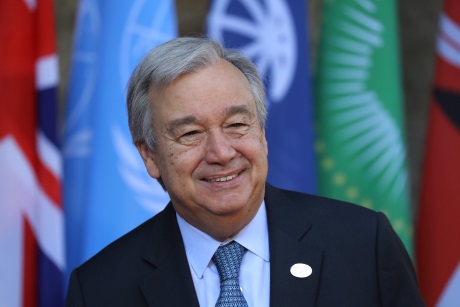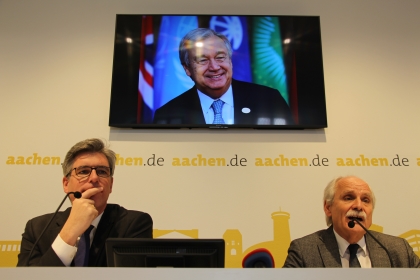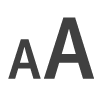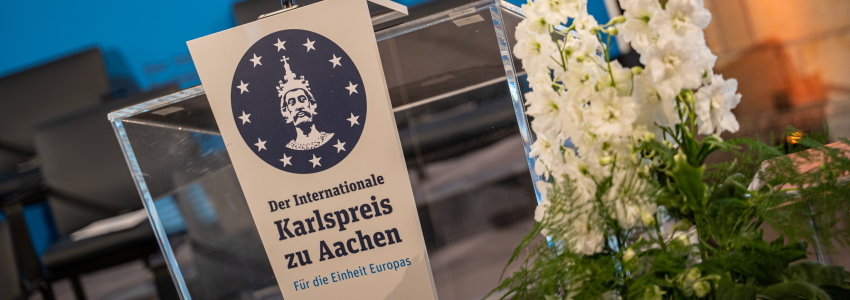"We need more commonality": Charlemagne Prize 2019 for António Guterres
- The Charlemagne Prize Board of Directors honour the Secretary-General of the United Nations for revitalising and consolidating multilateral cooperation based on the values and objectives of the EU and the UN.
- Chairman of the Board Jürgen Linden and Lord Mayor Marcel Philipp see Guterres as a man who is committed to strengthening multilateral cooperation, to diminishing the North-South Divide and to protecting our natural environment.
- The award ceremony to the former Portuguese Prime Minister will take place on Ascension Day, 30 May 2019, in the Coronation Hall of Aachen's Town Hall.
Secretary-General of the United Nations António Guterres is to be awarded the International Charlemagne Prize of Aachen. This was announced today (29 January 2019) in Aachen by Marcel Philipp, Lord Mayor of Aachen, and Dr. Jürgen Linden, Chairman of the Charlemagne Prize Board of Directors. The award ceremony, at which António Guterres will be honoured for his services towards a revitalisation and consolidation of multilateral cooperation based on the values and objectives of the European Union and the United Nations, will take place on Ascension Day, 30 May 2019, in the Coronation Hall of Aachen's Town Hall.

Foto: picture alliance / Sammy Minkoff
In an initial reaction, this year's Charlemagne Prize Laureate told Chairman of the Board Linden that he felt extremely honoured and was delighted to be receiving this prestigious accolade.
Common values and convictions
The citation of the Charlemagne Prize Board of Directors states: "Since the beginning of 2017, for the first time in over 30 years, definitive responsibility for the work of the United Nations rests in the hands of a European, the former Prime Minister of Portugal António Guterres. Guterres now acts, on the basis of the common values and convictions formulated for itself by the European Union, in the complex global world to promote pluralism, tolerance, dialogue, and most of all peace, liberty and democracy. Such an endeavour must expect to encounter setbacks."
"However," the citation continues, "the Board of Directors of the Society for the Conferring of the International Charlemagne Prize of Aachen wish to provide encouragement to the Secretary-General of the United Nations, Antonio Guterres, for such a significant commitment and are honoured to present him with the International Charlemagne Prize of Aachen 2019 in recognition of his dedication to a revitalisation and consolidation of multilateral cooperation based on the values and objectives of the European Union and the United Nations."
At the press conference this morning in Aachen, Jürgen Linden, Spokesman for the Board of Directors, emphasised that "Guterres calls for solidarity and empathy in daily life, dialogue and respect across political divides." It has always been one of his main concerns to call out and stamp out political populism, racism, xenophobia and extremism. When he took up office as UN Secretary-General in 2017, Guterres said, "All that we strive for as a human family — dignity, hope, progress and prosperity — depends on peace. But peace depends on us."

Chairman of Charlemagne Prize Board of Directors Dr. Jürgen Linden (right) and Lord Mayor Marcel Philipp introduce on 29.01.2019 in Aachen as the next Charlemagne Prize winner: the Secretary-General of the United Nations, Antonio Guterres. The award ceremony to the former Portuguese Prime Minister will take place on Ascension Day, 30 May 2019, in the Coronation Hall of Aachen's Town Hall. Photo: Stadt Aachen/David Rüben
"Profound knowledge of the world's trouble spots"
Lord Mayor Marcel Philipp pointed out that this year's Charlemagne Prize Laureate has "profound knowledge of the world's trouble spots and is very well acquainted with the needs of poorer countries and developing nations". It therefore came as no surprise that this well-networked politician, after his term as Prime Minister of Portugal, followed the proposal of the UN Secretary-General at that time, Kofi Annan, and in 2005 assumed the position of United Nations High Commissioner for Refugees. The Charlemagne Prize Board of Directors characterise the challenge of this position as a "Herculean task" for António Guterres, a challenge to which he responded with structural and organisational reforms and needs-based budgeting, but most significantly with a watchful eye on the observance of the human rights and human dignity of those seeking protection. During his ten years in office, the number of refugees rose dramatically from around 38 million in 2005 to over 60 million souls in 2015.
The Charlemagne Prize Board of Directors also see the choice of the European Guterres as UN Secretary-General "as a commitment by the world community to redouble its efforts in facing the major challenge of providing people fleeing from civil war, famine and destitution with a perspective, while at the same time effectively combating the root causes of migration in the countries of origin and achieving overall regulation of worldwide migration".
Chairman Linden stressed the fact that Guterres demands "more action and more ambition" from the international community – not just in terms of refugee and migration policies but also with regard to meeting the greatest challenge of our times": climate change.
Guterres impresses with his power of persuasion and his personality
It is with arguments like this that Guterres makes an impression and ensures that his voice is heard, according to the Board of Directors in Aachen. As the Secretary-General of the United Nations, Guterres actually has no power in the classic sense of the term. In Linden's words: "In fact, it is the power of persuasion and the personality of this 'man of vision, heart and action' (as the High Representative of the European Union for Foreign Affairs and Security Policy Federica Mogherini put it) that give weight to Guterres' words."
The Charlemagne Prize Board of Directors quote Guterres in their citation: "Even in democracies, trust is being lost in our own institutions, in our governments and in our media. Mistrust and fear are growing. Even in Europe, people are starting to think that it might be better to close the doors – meaning the borders. But we know that this path leads down the dead-end street of history. Do people really want to overcome the consequences of climate change on their own? Or the challenges of digitalisation of the world or of artificial intelligence, challenges which will blow apart everything that we hold familiar?" In Guterres' view, the structure of whole societies will change completely. "The more complex the world, the greater the risks, and the more need we will have for commonality. The United Nations provides a platform for the cultivation of common interests."
For pluralism, tolerance and dialogue
At the end of the press conference, Lord Mayor Philipp and Spokesman for the Board of Directors Linden summarised the decision of the Board of Directors as follows: "In a time when universal rights are being progressively undermined and democratic principles are coming under increasing pressure, the Board of Directors of the Society for the Conferring of the International Charlemagne Prize of Aachen elect to honour the Secretary-General of the United Nations, António Guterres, as an outstanding advocate for the European model of society, for pluralism, tolerance and dialogue, for open and caring societies, for the strengthening and consolidation of multilateral cooperation and for a community of nations that will effectively meet the existential challenges of the 21st century." And Linden and Philipp made clear what exactly these challenges are in particular: diminishing the North-South Divide and protecting our natural environment.
The award ceremony is meant as a sign of encouragement to all those who stand up for freedom, understanding, social and territorial cohesion of nations, and for the well-being of our "human family".
INFORMATION ON THE CHARLEMAGNE PRIZE
António Guterres will be the 61st recipient of the International Charlemagne Prize of Aachen. In 2018, the award went to the French President Emmanuel Macron. The winner of the award in 2017 was the British historian Timothy Garton Ash.
The International Charlemagne Prize of Aachen ranks as one of the most important European awards. Since 1950, it has been awarded to persons and institutions in recognition of services in the interest of European unification. Previous laureates include Konrad Adenauer (1954), the European Commission (1969), King Juan Carlos I of Spain (1982), Francois Mitterand and Helmut Kohl (1988), Václav Havel (1991), Queen Beatrix of the Netherlands (1996), the US President Bill Clinton (2000), Prime Minister of Luxembourg Jean-Claude Juncker (2006), German Chancellor Angela Merkel (2008), Jean-Claude Trichet (2011) and Martin Schulz (2015), at that time President of the European Parliament. In 2016, the Charlemagne Prize was awarded to Pope Francis. In March 2004, Pope John Paul II was awarded an extraordinary Charlemagne Prize, which was presented to him in Rome.
The award consists of a Certificate of Honour and a Medal bearing the oldest seal of the City of Aachen – dating from the 12th century and featuring an enthroned Charlemagne – on the front, and on the rear an inscription for the respective recipient of the award.
INFORMATION ON CITATION AND BIOGRAPHY
Please find as an attachment to this press release the official Citation of the Charlemagne Prize Board of Directors including biographical details of this year's Charlemagne Prize Laureate.




